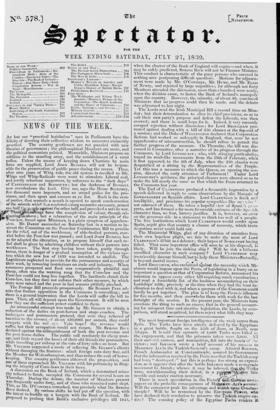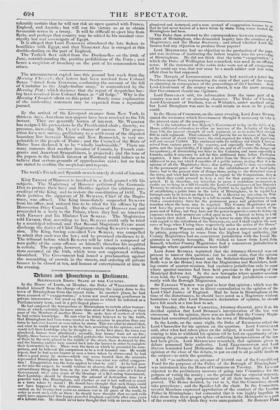The most important foreign intelligence of the week comes from
Syria. The Turks have been utterly defeated by the Egyptians in a great battle, fought on the 25th of .June, at Nezib, near Aleppo. It is said that upwards of 4,000 Turks were killed in the engagement, and that the prisoners taken were 5,000. All their nxutct1cf, cannon, and ammunition, fell into the hands of lie victors ; and Ina:tut:Ns wrote a brief account of his success to MEIIKMET ALI in the Turkish General's camp. Admiral Roussix, French Ambassador at Constantinople, assured his Government that the information received by the Porte was that the Turkish army had been " destroyed :" but this is perhaps too strong an expres- sion, as it appears that after the battle Ina-tout made a retrograde movement to Aintab ; whence it may be inferred, th tN• 'tTtAoi were, notwithstanding their defeat, in .a pgititsoM him trouble and render caution necessary. There is much speculation in the Frenc an .nevrs- papers on the probable consequences of M • litre.Ap01 sacs eves Will the conqueror push his advantage and witliOt opOn'Coustou- tinople ? Will he be restrained by the EuroPeAs;Airers, who have declared their resolution to preserve the.linkiali empire ens tire ? The cunning policy of the Egyptian Pa tigt renaers it tolerably certain that he will not risk an open quarrel with France, England, and Austria ; but will use his victory so as to obtain favourable terms in a treaty. It will be difficult to eject him from Syria, and perhaps that country may be added to his nominal vice- royalty but real sovereignty of Egypt.
It is alleged that Lord PomoNur stimulated the late Sultan to hostilities with Egypt, and that MEHEMET ALI is enraged at this double-dealing on the part of England.
The Turkish fleet sailed from the Dardanelles on the 28th of June, notwithstanding the positive prohibitions of the Porte ; and hence a suspicion of treachery on the part of its commanders has arisen.



























